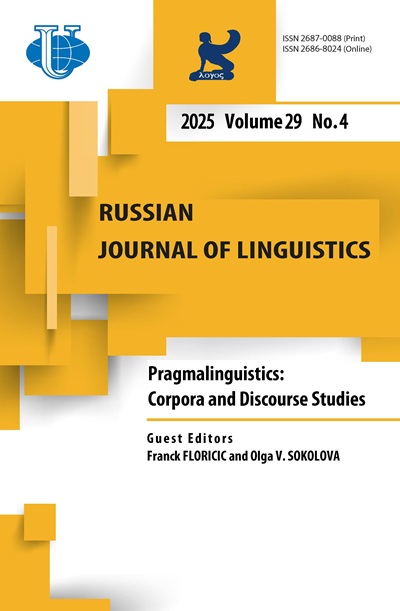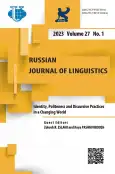Translingualism and intercultural narratives in Kiana Davenport’s “House of Many Gods”
- Authors: Galaktionov S.S.1, Proshina Z.G.1
-
Affiliations:
- Lomonosov Moscow State University
- Issue: Vol 27, No 1 (2023): Identity, Politeness and Discursive Practices in a Changing World
- Pages: 216-234
- Section: Articles
- URL: https://bakhtiniada.ru/2687-0088/article/view/313518
- DOI: https://doi.org/10.22363/2687-0088-33328
- EDN: https://elibrary.ru/UPNXEI
- ID: 313518
Cite item
Full Text
Abstract
Language and culture contacts resulting from the migration of population, as well as current geopolitical and technological processes, enhance the increase of translingual works that reveal symbiotic phenomena of languages and cultures in contact. However, there are still many unsolved problems in defining the translingual discourse and linguistic devices for creating it. The article discusses intercultural narratives in a novel by Kiana Davenport, an American author of Hawaiian descent, whose literary creative translingual work is enhanced by intercultural phenomena related to the contacts of American English, Hawaiian, and Russian languages. The article aims to describe linguistic devices for creating translingualism and to characterize the processes that take place in assimilation and language alteration in contact situations. The research has revealed that translinguality characterizes not only texts that are written in a second language, as is a traditional point of view, but also writings of a bilingual with two native languages enhanced by a third one. Translinguality can be reached by various linguistic tools comprising lexical borrowings, including endonymic toponyms and culture-specific concepts, loan translations, allusions, as well as pidginization of speech and some others. The findings showed that pidginization of speech of different characters results in stylized dialogues with deviated articulation of English words, intentional grammatical deviations, set expressions from Hawaiian Pidgin and wordplay. The results of the paper expand the idea of translingualism and intercultural communication and can be used for further research into linguistic and cultural contacts.
About the authors
Semyon Sergeevich Galaktionov
Lomonosov Moscow State University
Author for correspondence.
Email: semengal98@mail.ru
ORCID iD: 0000-0001-9025-5522
second-year postgraduate student at the Faculty of Foreign Languages and Regional Studies of Lomonosov Moscow State University. His field of study is comparative, typological and contrastive linguistics. His research interests are at the intersection of translation studies, and comparative literary, postcolonial and Polynesian studies. He has published a number of scholarly works dedicated to analyzing contemporary Polynesian literature.
Moscow, RussiaZoya Grigor'evna Proshina
Lomonosov Moscow State University
Email: proshinazoya@yandex.ru
ORCID iD: 0000-0002-0570-2349
Doctor of Philology (Habil.), Professor at the Department of Theory for Teaching Foreign Languages, Faculty of Foreign Languages and Regional Studies of Lomonosov Moscow State University. Her research interests are in translation studies, World Englishes paradigm, comparative linguistics, and sociolinguistics. She has authored, coauthored, edited and co-edited a number of books, journals, and articles.
Moscow, RussiaReferences
- Canagarajah, Suresh. 2002. Multilingual writers and the academic community: Towards a critical relationship. Journal of English for Academic Purposes 1. 29-44. https://doi.org/10.1016/S1475-1585(02)00007-3
- Canagarajah, Suresh. 2013. Translingual Practice: Global Englishes and Cosmopolitan Relations. London and New York: Routledge, Taylor and Francis Group.
- Carr, James R. 2014. Hawaiian Music in Motion: Mariners, Missionaries, and Minstrels. Illinois: University of Illinois Press. https://doi.org/10.5406/illinois/ 9780252038600.001.0001
- Dagnino, Arianna. 2012. Transcultural writers and transcultural literature in the age of global modernity. Transnational Literature 4 (2). 1-14.
- Davenport, Kiana. 2007. House of Many Gods: A Novel. New York: Ballantine Books.
- Desmond, Jane. 1999. Staging Tourism: Bodies on Display from Waikiki to Sea World. Chicago: University of Chicago Press.
- Drager, Katie. 2012. Pidgin and Hawai‘i English: An overview. International Journal of Language, Translation and Intercultural Communication 1. 61-73. https://doi.org/10.12681/ijltic.10
- Ho’omanawanui, Ku’ualoha. 2017. He Ahu Mo‘olelo: E Ho‘okahua i ka Paepae Mo‘olelo Palapala Hawai‘i / A Cairn of Stories: Establishing a Foundation of Hawaiian Literature. Palapala 1. 51-100.
- Indriyanto, Kristiawan. 2021. Reconciling locality and globalization through sense of planet in Kiana Davenport’s the House of Many Gods. Rupkatha Journal on Interdisciplinary Studies in Humanities 13 (1). 1-9. https://doi.org/10.21659/rupkatha.v13n1.24
- Ishii, Satoshi. 2006. Complementing contemporary intercultural communication research with East Asian sociocultural perspectives and practices. China Media Research 2 (1). 13-20.
- Kabakchi, Victor V. & Zoya G. Proshina. 2021. Leksiko-semanticheskaya otnositel’nost’ i adaptivnost’ v perevode i mezhkul’turnoi kommunikatsii [Lexical and semantic relativity and adaptivity in translation and intercultural communication]. Russian Journal of Linguistics 25 (1). 165-193. (In Russ.)
- Kellman, Steven G. 2000. The Translingual Imagination. Nebraska: University of Nebraska Press.
- Kellman, Steven G. 2019. Literary translingualism: What and why? Polilinguality and Transcultural Practices 16 (3). 337-346.
- Lee, Jerry W. 2022. Locating Translingualism. Cambridge: Cambridge University Press.
- Leontovich, Olga A. 2003. Rossiya i SShA: Vvedenie v mezhkul’turnuju kommunikaciju [Russia and USA: Introduction to the theory of intercultural communication]. Volgograd: Peremena. (In Russ.)
- McDougall, Brandy N. 2021. Excerpt from Finding Meaning: Kaona and Contemporary Hawaiian Literature. Journal of Transnational American Studies 12 (2). 52-85. https://doi.org/10.5070/T812255589
- Nordin, Irene G., Julia Hansern & Carmen Z. Llena. 2013. Inroduction: Conceptualizing transculturality in literature. In Irene G. Nordin, Julia Hansen & Carmen Z. Llena (eds.), Transcultural identities in contemporary literature. ix-xxvii. Amsterdam, New York: Rodopi.
- Ortiz, Fernando. 1995. Cuban Counterpoint: Tobacco and Sugar. Durham, and London: Duke University Press.
- Proshina, Zoya G. 2016. Problemy i perspektivy translingval’nyh i transkul’turnyh kontaktov (vvedenie k tematicheskomu vypusku zhurnala) [Problems and perspectives of translingual and transcultural contacts (introduction to the special issue of the journal)]. The Humanities and Social Studies in the Far East 2 (50). 6-9. (In Russ.)
- Proshina, Zoya G. 2017. Translingualism and its application. Vestnik RUDN. Seriya: Voprosy obrazovaniya: yazyki i special’nost’ 14 (2). 155-170. https://doi.org/10.22363/2312-8011-2017-14-2-155-170
- Rivlina, Alexandra A. 2016. Formirovaniye globalnogo amglo-mestnogo bilingvisma i usileniye translingvalnoy praktiki [Global English-local bilingualism development and intensification of translanguaging]. The Humanities and Social Studies in the Far East 2 (50). 26-33. (In Russ.)
- Said, Edward W. 1993. Culture and Imperialism. London: Vintage.
- Swann, Joan, Ana Deumert, Theresa Lillis & Rajend Mesthrie. 2004. A Dictionary of Sociolinguistics. Tuscaloosa: The `University of Alabama Press.
- Ter-Minasova, Svetlana G. 2004. Yazyk i mezhkul’turnaya kommunikaciya [Language and intercultural communication]. Moscow: Slovo. (In Russ.)
- Tlostanova, Madina V. 2004. Postsovetskaya literatura i estetika transkul’turacii. Zhit’ nikogda, pisat’ niotkuda [Post soviet literature and the aesthetic of transculturation. Never living, writing from nowhere]. Мoscow: Editorial URSS. (In Russ.)
- Tlostanova, Madina V. 2011. Transkul’turaciya kak model’ sociokul’turnoi dinamiki i problema mnozhestvennoi identifikacii [Transculturation as a model of sociocultural dynamic and the problem of multiple identification]. Voprosy social’noi teorii V. 126-149. (In Russ.)
- Trask, Haunani-Kay. 1999. From a Native Daughter: Colonialism and Sovereignty in Hawai’i (Revised Edition). Honolulu: University of Hawai’i Press.
- Ulukau Hawaiian Dictionaries. Retrieved from https://wehewehe.org/?l=en (accessed 12 March 2023).
- Velupillai, Viveka. 2013. Hawai’i Creole. In Susanne Maria Michaelis, Philippe Mauer, Martin Haspelmath & Magnus Huber (eds.), The Survey of Pidgin and Creole languages 1, 252-261. Oxford: Oxford University Press.
- Wanner, Adrian. 2011. Out of Russia: Fictions of a New Translingual Diaspora. Evanston, Ill.: Northwestern University Press.
- Zhukova, Irina N., Maria G. Lebed’ko, Zoya G. Proshina, Natalya G. Yuzefovich. 2013. Slovar’ terminov mezhkul’turnoI kommunikacii [A dictionary of terminology of intercultural communication]. Moscow: Flinta : Nauka. (In Russ.)
Supplementary files











